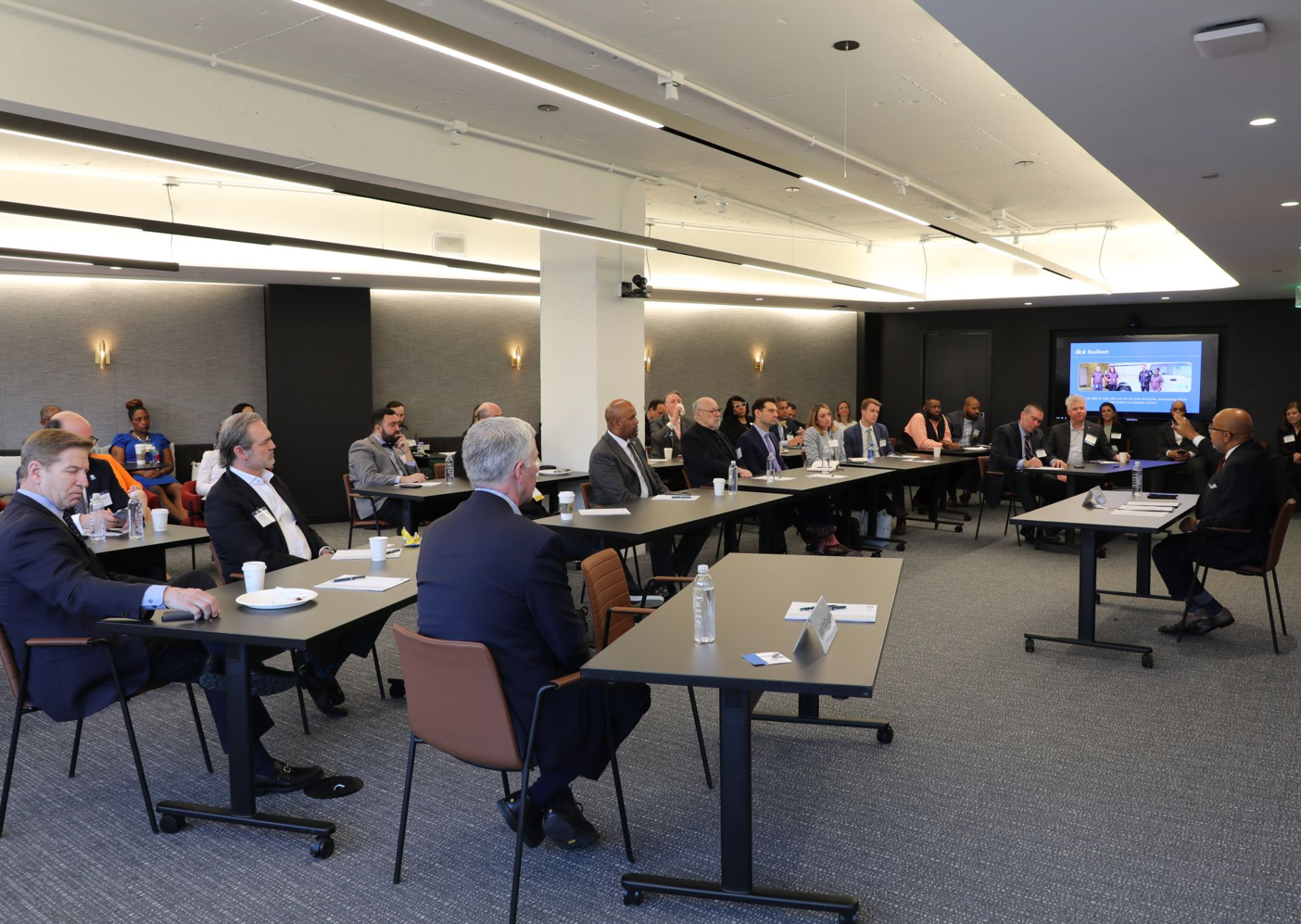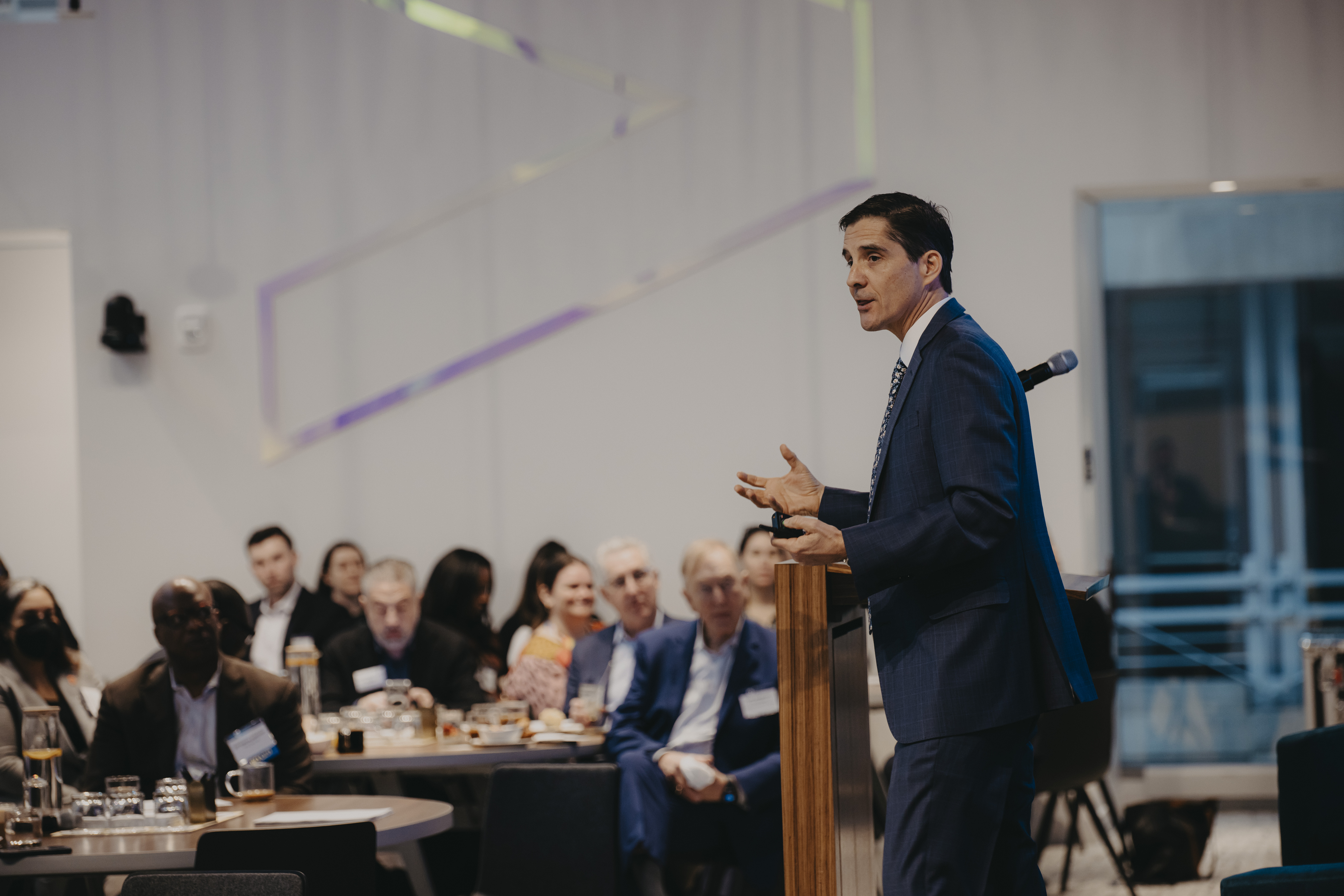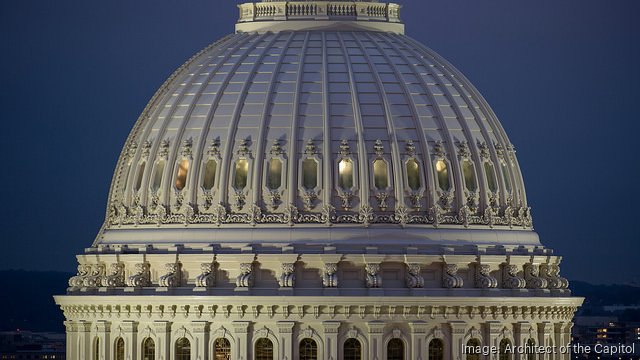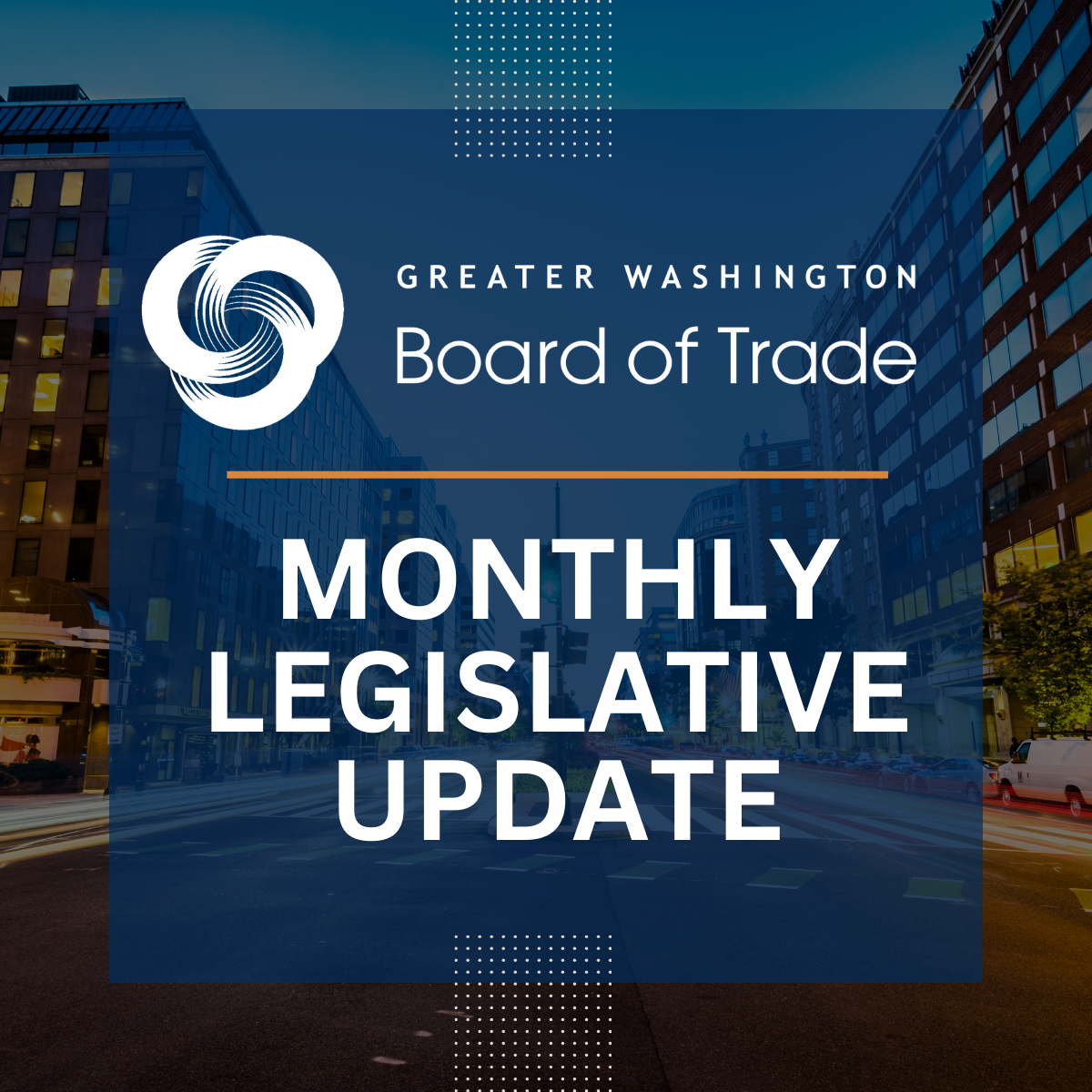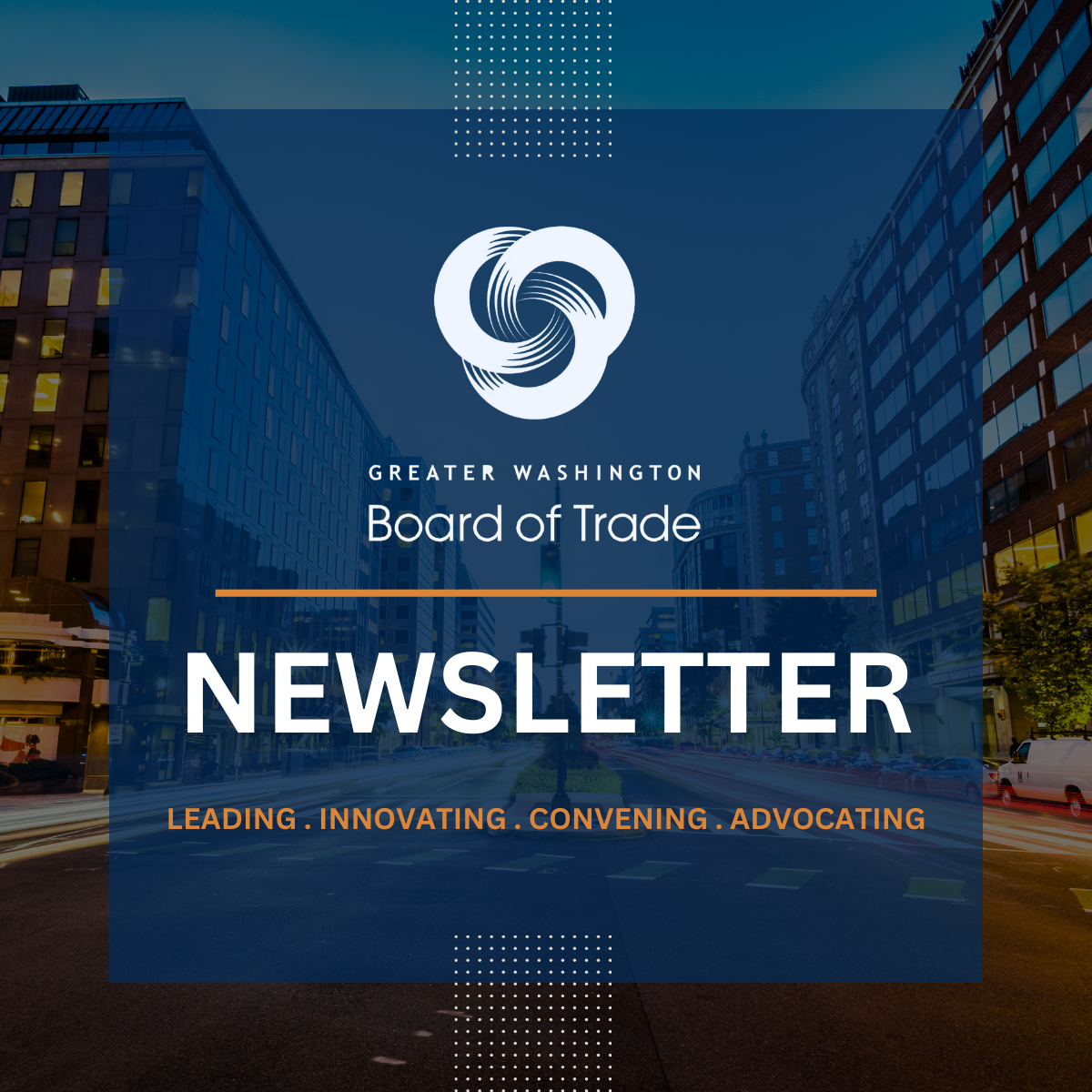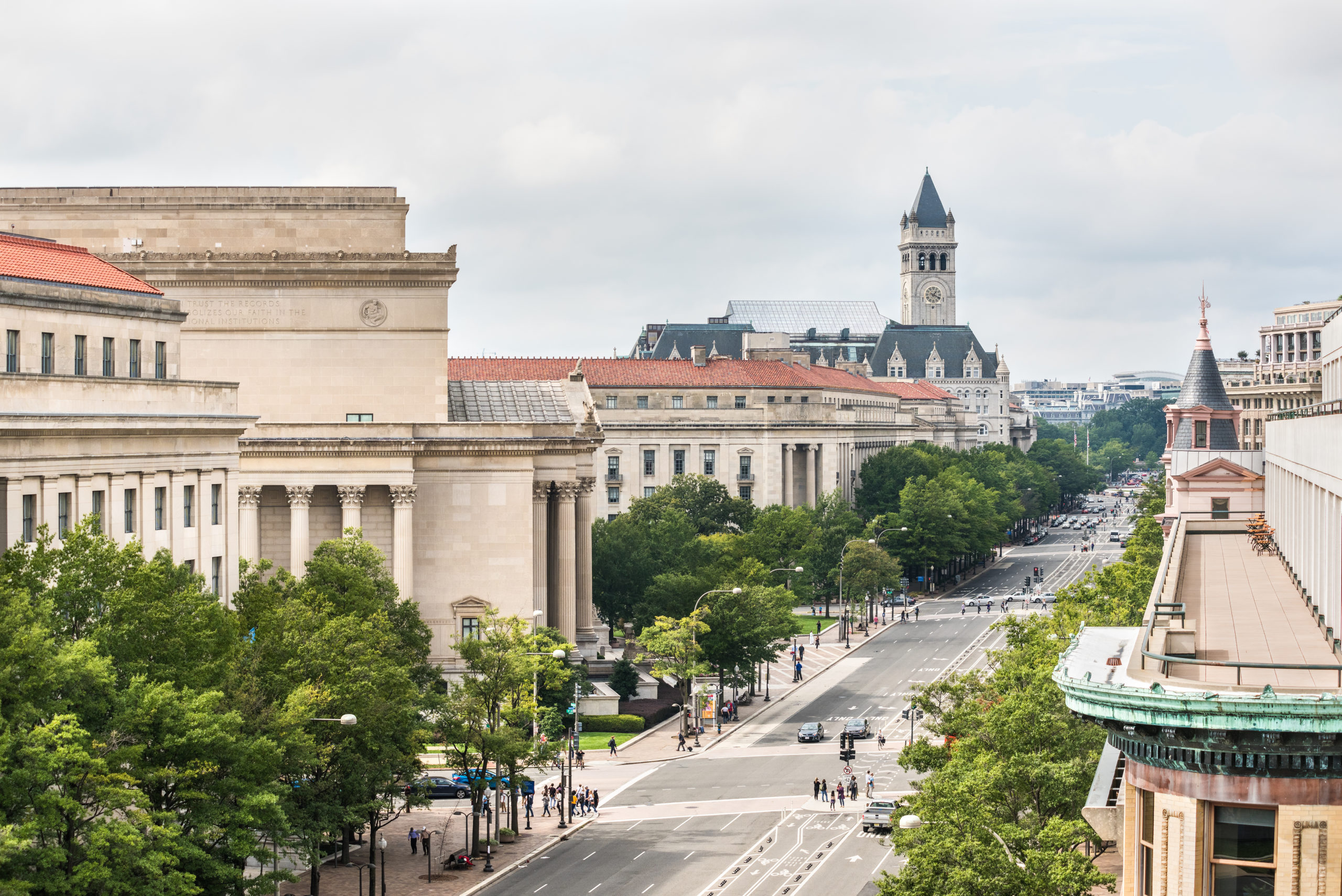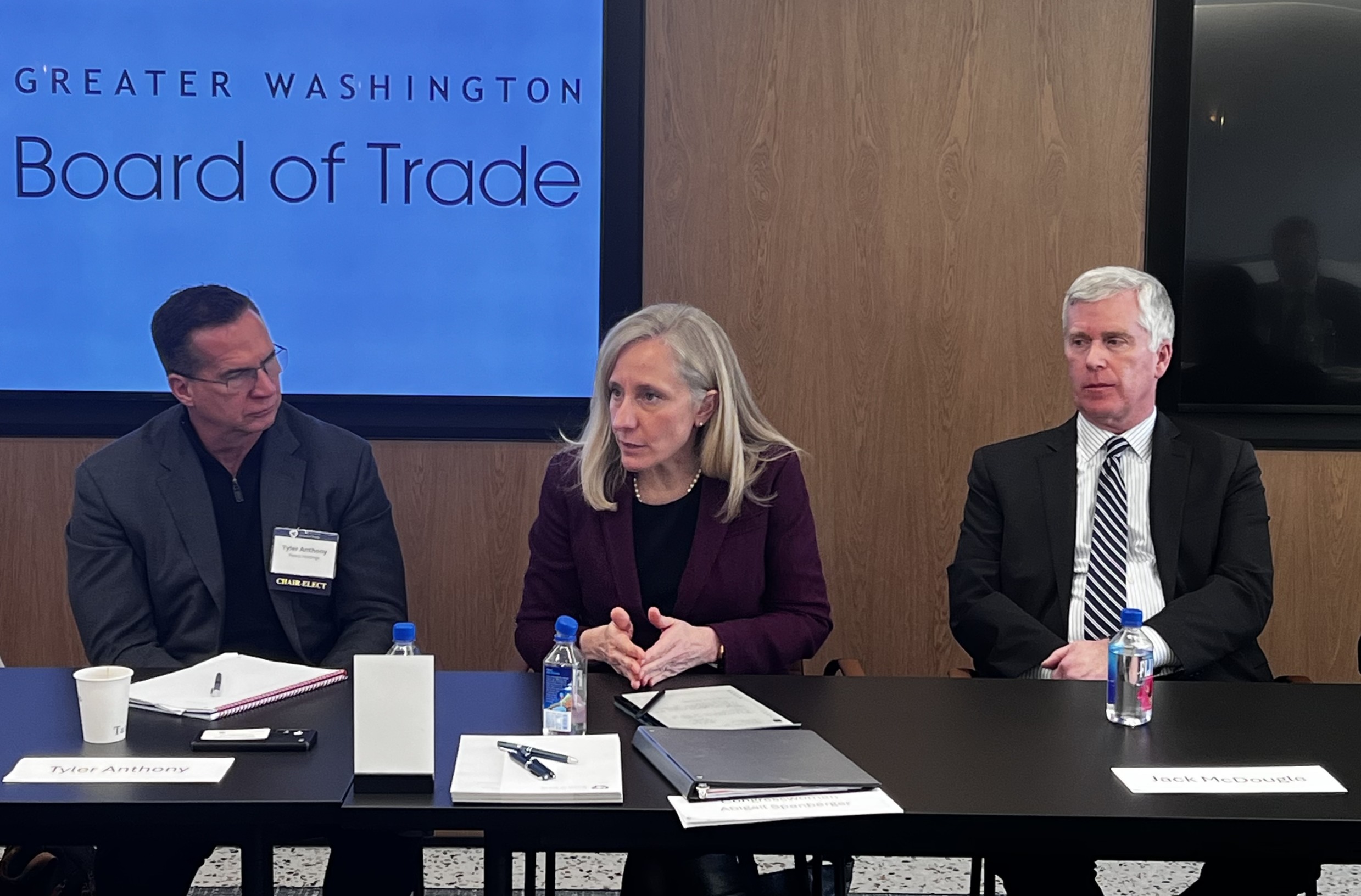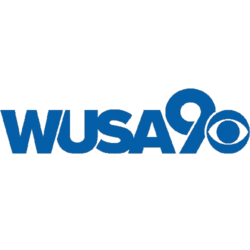The Board of Trade remains focused on advancing the priorities that matter most to Greater Washington. This March newsletter shows a variety of engagements we have had across the region with members and public officials while also showcasing meaningful updates on priorities we are following in the region. We also have a variety of member news updates that showcase regional collaboration!
Author: Board of Trade
DC Water CEO David Gadis Highlights Urgent Infrastructure Needs and Future Solutions
The Board of Trade hosted DC Water CEO and General Manager David L. Gadis on Feb. 26 for an insightful discussion with regional industry leaders. The conversation provided a comprehensive look at the challenges and opportunities facing the District’s water system.
With 80% of the infrastructure exceeding its expected lifespan, including pipes dating back to the Civil War, Gadis emphasized the urgent need to address system vulnerabilities. He warned that a major system failure could cost the region up to $150 million per day in losses, a number that would continue to grow with each additional day of service disruption. Additionally, he highlighted the District’s reliance on a single water source, making it the only major U.S. city without a secondary supply.
The discussion also explored the need for federal approvals and investments to secure additional water sources and storage facilities, such as the Travilah quarry. Securing these alternatives is essential to strengthening the region’s long-term water resilience, and DC Water is continuing to monitor any potential financial cutbacks at the federal level that could impact funding for its projects.
Gadis addressed questions about DC Water’s strategy for maintaining a sustainable and reliable water supply. He stressed the importance of public-private partnerships in advancing key initiatives while ensuring water affordability. He also highlighted ongoing projects like the Lead Free DC Initiative -to replace lead service lines- and the Clean Rivers Project – a large-scale tunnel project designed to reduce pollution and enhance the system’s resilience.
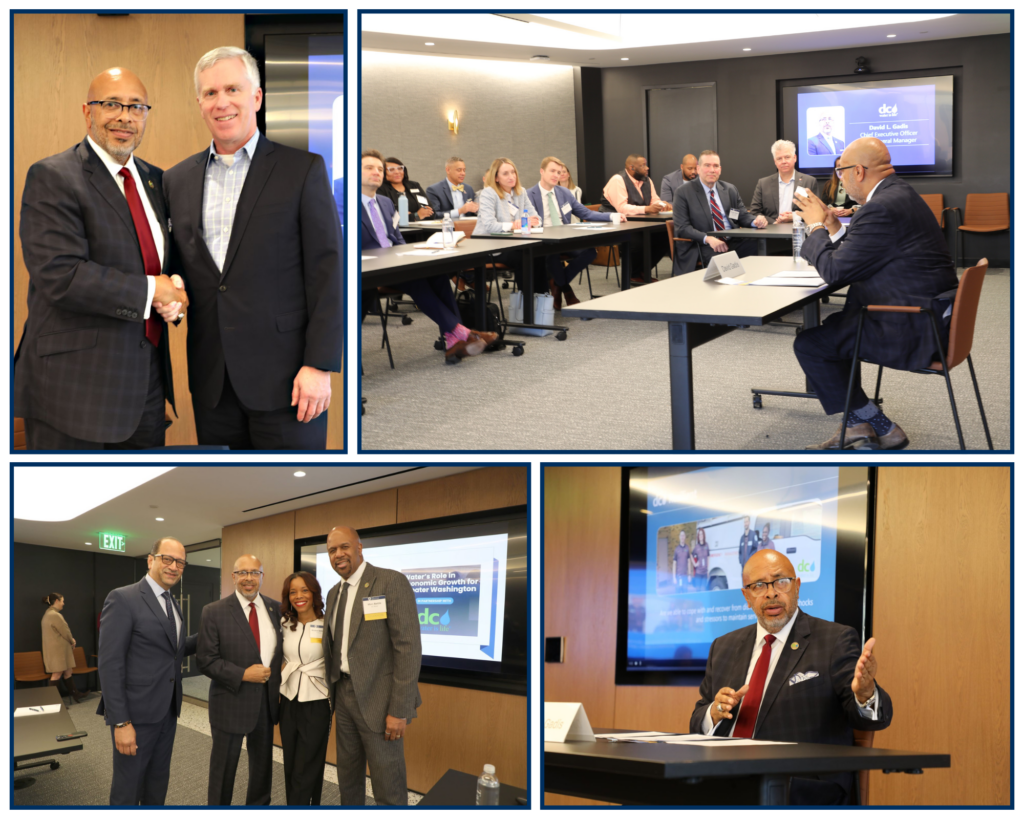
CHECK OUT MORE EVENT PHOTOS HERE
With global challenges like sea-level rise and aging infrastructure, Gadis underscored the need for proactive measures and sustainable practices. Through continued collaboration, innovation, and forward-thinking initiatives, DC Water remains committed to delivering high-quality, sustainable water service to the D.C. community for generations to come.
Gadis also spoke extensively about the importance of D.C.’s Anacostia and Potomac rivers and the ongoing need for effective monitoring systems. He emphasized collaboration with the Army Corps of Engineers and localities in Virginia and Maryland to ensure continued improvements in water quality.
He highlighted the critical role of partnerships in maintaining the health of these waterways, particularly after storms, which require coordinated cleanup efforts along the Anacostia River. He also noted the need for ongoing monitoring of the Potomac River to detect and address potential threats, such as droughts or algae blooms, that could impact water filtration and supply.
In closing, Gadis spoke about his journey to becoming the head of DC Water as a third-generation water utility professional, including his previous stint as the President and CEO of the Indianapolis Water Company. It was an inspiring moment when he shared how his career path has allowed him to help people and serve communities, including helping provide water to more than 700,000 District residents and 25 million annual visitors as the leader of DC Water.
Thank you to DC Water and David L. Gadis for engaging our membership about water resiliency and the need to look at the region’s water systems as a vital economic source that must be invested in and maintained for the future of our communities.
LEARN MORE ABOUT REGIONAL WATER SUSTAINABILITY EFFORTS
Building Bridges: A Community Dialogue on the Future of 11th Street Bridge Park
The Board of Trade convened an impactful discussion at Accenture’s Innovation Hub in Downtown D.C. on March 5, bringing together business leaders, nonprofit organizations, and community stakeholders for A Community Conversation with 11th Street Bridge Park. This event, part of our broader Pathways to Prosperity initiative, underscored the power of collaboration in advancing equitable economic growth across our region.
The 11th Street Bridge Park project of the Ward 8 non-profit Building Bridges Across the River is a national model for business-nonprofit collaboration that will bridge community access from Navy Yard to Anacostia. Board of Trade members, regional leaders, and changemakers engaged in a dynamic exchange about this investment and others shaping the region’s future, particularly in historically underserved areas.
A Collective Commitment to Inclusive Growth
The conversation showcased the dedication of our partners, Accenture, 11th Street Bridge Park, Comcast, TD Bank, and many others, who are working to expand economic opportunities and build stronger communities.
The discussion reinforced a critical point: there are countless challenges that can derail projects, but success is built through persistence, partnership, and a commitment to economic, environmental, and community well-being. This initiative is about more than just a bridge; it is about cutting through the noise, focusing on investments that create impact, and ensuring that community-driven development leads to long-term prosperity.
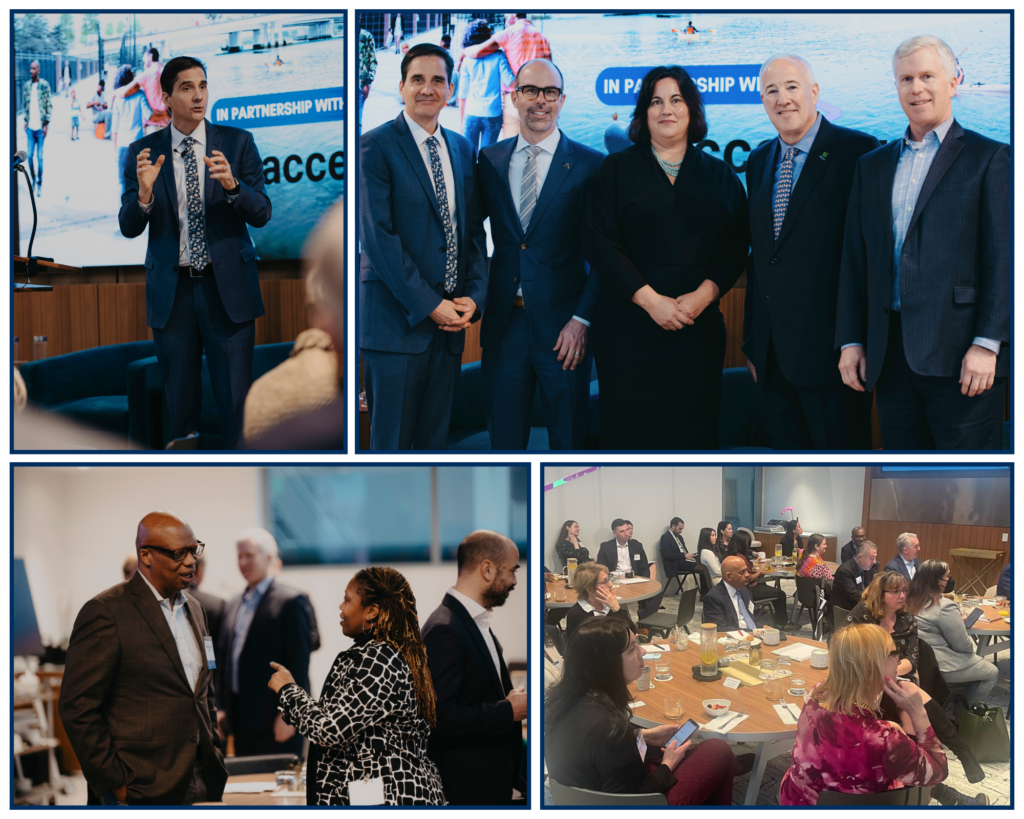
VIEW MORE PHOTOS FROM THIS EVENT
Leveraging Strengths to Drive Impact
One of the most compelling takeaways from the event was the recognition that no one entity has all the answers, but together, we bring the expertise and resources necessary to drive meaningful change. Collaboration is not just beneficial; it is essential for achieving sustainable economic progress.
While the moral case for inclusive economic development is well understood, the event emphasized the economic imperative of investing in communities. With over $1 billion in economic development expected in Ward 8 over the next five years, now is the time to be intentional about ensuring these investments serve the local community. Through partnerships with trusted organizations, we can help expand market opportunities, enhance financial literacy, and create stronger, more resilient businesses.
An Opportunity to Get It Right
The stakes are high, but so is the potential for transformational impact. The Board of Trade remains committed to amplifying initiatives that foster whole-community solutions, addressing systemic barriers, and creating pathways for generational economic mobility.
This event aligns directly with our Pathways to Prosperity and Business Growth Initiative frameworks, which focus on advancing equitable access to capital, business growth, and workforce development as key drivers of regional success. By continuing to champion public-private-philanthropic collaborations, we can help build an inclusive economy that benefits everyone.
Looking Ahead: Join the Movement
The Greater Washington Board of Trade will continue to bring leaders together to drive forward-thinking conversations and actionable strategies for regional economic growth. We invite our members and stakeholders to stay engaged, whether by attending future convenings, participating in leadership workshops, or collaborating on initiatives that expand economic opportunity.
If you’re interested in learning more about our efforts or becoming part of the solution, contact us today. Together, we can build a stronger, more inclusive regional economy.
Full Recording of 11th Street Bridge Park Conversation
Congress Should Preserve DC’s Home Rule and Withdraw the Bowser Act | WBJ Viewpoint
Federal Policy & Washington DC’s Economic Future
The future of Washington, D.C., as a vibrant economic hub, depends on smart federal policy decisions that ensure continued investments, support the workforce, and keep agencies in the region. The proposed Bowser Act would restrict D.C.’s self-governance by imposing an additional layer of federal oversight, a change that could impact the city’s future growth and success.
In a new Washington Business Journal viewpoint, Board of Trade President & CEO Jack McDougle discusses why federal officials must work with the D.C. Government to ensure the District has long-term economic stability. As Congress considers policies for the District, such as the Bowser Act, it’s essential to recognize its broader implications for businesses and communities.
D.C. is not just the seat of the federal government; it’s a vital economic hub that drives regional and national prosperity.
The Board of Trade continues to advocate for policies that:
- Retain federal agencies in the region to sustain jobs and economic activity
- Support workforce transitions and investments in economic mobility
- Preserve D.C.’s ability to govern itself, ensuring the region remains competitive and economically resilient
Federal policy decisions don’t just impact the District, they shape Greater Washington’s entire regional economy.
ABOUT THE BOARD OF TRADE
The Greater Washington Board of Trade, founded in 1889, is the region’s premier non-partisan business organization representing industry, nonprofits, universities, and government agencies. The Board of Trade addresses complex and always-evolving business concerns that stretch across the District of Columbia, suburban Maryland and Northern Virginia, with a priority focus on inclusive economic growth, improving the business climate, and enhancing the region’s economic competitiveness.
READ MORE POLICY ISSUES AND TOPICS THE BOARD OF TRADE IS FOLLOWING
- Beyond the Data: 2024 NAEP math results are alarming
- Looking Ahead: The Road to 2025 and Beyound for GWBOT Policy Team
- Virginia gubernatorial candidate Abigail Spanberger meets with Greater Washington’s business community
- Waterway Economics: Funding increases for region’s Post of Baltimore and Port of Virginia
- Testimony: Downtown Arena Revitalization Act of 2024 (DC B25-1004)
LEARN ABOUT UPCOMING BOARD OF TRADE MEMBER OPPORTUNITIES
GWBOT February 2025 Legislative Update
The Board of Trade’s advocacy, convening, and thought leadership activities support regional outcomes that will help Greater Washington grow and adapt for generations to come. The GWBOT Legislative Update shares legislation and policy insights from the Greater Washington region.
Read our February 2025 Legislative Update here
GWBOT February 2025 Newsletter
The Board of Trade remains focused on advancing the priorities that matter most to Greater Washington. This February newsletter shows a variety of engagements we have had across the region with members and public officials while also showcasing meaningful updates on priorities we are following in the region. We also have a variety of member news updates that showcase regional collaboration!
Read our February 2025 Newsletter here
Beyond the Data: 2024 NAEP math results are alarming
Below is a letter on the Release of 2024 NAEP Math Results from our member and partner at the Collaborative for Student Success that the Greater Washington Board of Trade has signed on to and supports:
The latest National Assessment of Educational Progress (NAEP) results in mathematics should alarm us all and spur urgent action — particularly as recent research shows that math scores are closely tied to salary at age 30 for children of all backgrounds.1 Yesterday’s release of the Nation’s Report Card highlights significant and ongoing challenges in student math achievement — challenges that must be addressed by states, districts, and schools to prepare students for the workforce demands of today and tomorrow.
“Every time our nation is faced with low results on the NAEP exam, we express shock and dismay at the state of math education in our country,” said Jim Cowen, Executive Director of the Collaborative for Student Success. “But 48 hours later, the headlines fade, and little changes. This time must be different. Let’s commit to concrete action to improve math achievement for all students.”
We, the undersigned, recognize the challenge these results present. Rather than dwell on the numbers, we call on states and districts to take decisive action by adopting policies that will raise student math achievement. United, we ask policymakers to embrace bipartisan solutions that help ensure all kids — especially those from under-resourced communities — have access to a high-quality math education.
Together, we recommend six key strategies, backed by research and practice:
- Expand access to high-quality instructional materials aligned to rigorous standards.
- Provide educators with high-quality professional learning focused on effectively using instructional materials in the classroom.
- Increase instructional time by extending learning opportunities before, during, and after the school day.
- Automatically enroll students into advanced math courses based on objective assessment results or other data.
- Hold teacher preparation programs accountable for equipping teachers with the skills and content needed to succeed in math instruction.
- Leverage math coaches at the school or district level to work closely with teachers to improve classroom practice and, ultimately, student math achievement.
Moreover, we call upon local leaders to directly connect the math needs of our students to the workforce necessities of our communities. There’s no question that the more students that have a strong math education, the stronger our workforce will be.
“Business and industry leaders across our region, and the nation, are seeking applicants with strong math, reasoning, and data analysis skills,” said Jack McDougle, President & CEO, Greater Washington Board of Trade. “Both a child’s potential for success and the future health of our workforce are dependent on equipping students with the skills that math helps form and strengthen.”
Progress is Possible — and Already Happening
States across the country are proving that progress is within reach:
- Rhode Island and Mississippi alike have taken concrete steps to increase access to high-quality instructional materials in math.
- Texas, Washington, and North Carolina have implemented automatic enrollment policies to ensure students are not overlooked for advanced math coursework.
- Arkansas and Massachusetts have strengthened teacher preparation programs, requiring higher standards for math instruction.
- Alabama and Colorado are offering programs and resources that empower teachers to improve instruction and extend learning beyond the classroom.
These success stories demonstrate that bipartisan action can yield real results. Now is the time for every state and district to follow their lead.
Yes, the NAEP results are concerning — but we cannot let them be the final word. Instead, they should be the starting point for collective action. Together, we can ensure that every student has the opportunity to excel in math.
It is time to move past the data and ensure that our collective actions speak louder than the numbers released yesterday.
Below are companies and organizations that have signed on to support this letter:
A+ Education Partnership
Best NC
Collaborative for Student Success
EdTrust
EdTrust-West
Educate Texas
Education Reform Now
Educators for Excellence – NY
EmpowerK12
ExcelinEd
Greater Washington Board of Trade
Just Equations
Maryland Out of School Time Network
Maryland STEM Education to Employment Ecosystem
Memphis Lift
Nashville PROPEL
National Alliance for Public Charter Schools
National Council on Teacher Quality
National Parents Union
NewMexicoKidsCAN
OhioExcels
Parent Shield Fort Worth
Powerful Parent Movement
Prichard Committee
STEM Center of Excellence, Inc.
Thomas B. Fordham Institute
TNTP
Zearn Math
Looking Ahead: The Road to 2025 and Beyond for GWBOT Policy Team
The Greater Washington Board of Trade’s Policy team has been busy engaging with key stakeholders, tracking critical legislation, and continuing conversations around crucial initiatives to start the year. As we look forward to an exciting 2025, our policy team is gearing up to tackle a wide range of pressing issues that will shape the future of our community, economy, and workforce. From transportation and technology to workforce development and economic growth, we are committed to addressing the challenges and opportunities that lie ahead.
Here’s an overview of the key issues we’ll be focusing on in the coming year:
Transportation: Budget Negotiations, Autonomous Vehicles, and Regional Connectivity
In 2025, transportation remains a critical area of focus. The Washington Metropolitan Area Transit Authority (WMATA) funding will be a central issue as we work to ensure the sustainability and reliability of the region’s transit network. Securing stable, long-term funding for WMATA is essential for maintaining services and improving infrastructure to meet growing demand, which is an effort that Jack McDougle, President and CEO of the Greater Washington Board of Trade, has played a pivotal role in advancing as the DMVMoves Community Partners Advisory Group Chair for the DMVMoves initiative. The coalition brings leaders in the District of Columbia, Maryland, and Virginia together to develop a unified vision that will deliver a more efficient, reliable, and seamless experience for transit users across our region. Enhancing rail infrastructure can reduce congestion, lower emissions, and improve access to economic opportunities across the region.
Additionally, the rise of autonomous vehicles is poised to revolutionize how we approach transportation, and our team will be monitoring regulatory developments and opportunities for integration. We will continue to advocate for policies and opportunities that support innovation while ensuring safety and accessibility.
Technology: AI, Data Centers, and Digital Transformation
In the technology sector, 2025 will bring an increasing focus on artificial intelligence (AI) and the growth of data centers, which will play a critical role in shaping industries, workforces, and policies across the Washington, D.C. region. As digital transformation accelerates, AI will continue to revolutionize sectors like healthcare, defense, cybersecurity, and education, creating new opportunities and challenges. In tandem with this technological evolution, the region is seeing a surge in the development of data centers, which are essential for supporting the vast amounts of data AI systems require to function effectively. These data centers not only support the AI-driven innovations but also enable the broader digital economy by providing the backbone infrastructure for cloud computing, storage, and high-speed connectivity.
On the heels of President Trump’s recent announcement of an investment of $500 Billion over the length of his presidency, the policy team will remain engaged with stakeholders to ensure that AI and data centers are developed in a manner that meets our region’s growing demands for a robust technological infrastructure such as reducing the digital divide, fostering workforce development in AI and tech sectors, and creating a balanced, equitable approach to inclusive economic growth.
Follow news and updates on policy and legislation in the region on our GWBOT Policy & Priorities web page
Workforce Development: Federal Workforce Return to Office, Public-Private Partnerships, Automation
The return to a full, five-day workweek for federal employees, as outlined in recent executive action taken by President Trump, will have significant implications for workforce development. Our team will monitor the impact of these changes, and we will also continue to support initiatives that foster workforce development, particularly as industries evolve in response to technological and workplace advancements.
Federal workforce initiatives will remain a priority as we work to ensure that government agencies attract and retain top talent in an increasingly competitive job market. This includes advocating for policies that promote professional development and training programs to equip workers with the skills they need to succeed in the digital age, as well as taking a comprehensive well-round approach to what attracts skilled workers to the region including housing affordability, cost of living, and opportunities for advancement.
Economy: Tax Reform, Housing Affordability, and Hospitality
In 2025, our team will also focus on key economic issues, including possible tax reform initiatives in Virginia, Maryland, and the federal government. Recent state legislation in both Virginia and Maryland has proposed tax reforms aimed at easing the financial burdens on residents and businesses, such as efforts to reduce income taxes, automobile taxes, and reform business taxes to encourage investment and job growth. Housing affordability remains a significant challenge, as the D.C. metro area continues to experience high demand as a desirable location to settle in. Meanwhile, the hospitality sector, a key driver of the regional economy, is undergoing change once again as it responds not only to the COVID-19 pandemic but also to the impending return-to-work executive order, which is expected to drive up demand for these services and have an impact on the Downtown DC Revitalization Plan.
As we monitor and engage on these economic issues, our goal will be to ensure that tax policies, housing strategies, and support for hospitality contribute to a thriving, resilient regional economy. Our team will stay engaged with stakeholders to ensure that reforms foster economic growth, improve quality of life, and enhance the D.C. region’s competitive position.
Regionalism: How the Region Continues to Engage with the Federal Government
The Washington, D.C. region is home to a remarkable concentration of federal agencies, business and thought leaders, innovators, entrepreneurs, scholars, to name a few. This unique proximity enables unparalleled collaboration between the federal government, local, and state governments, fostering an environment where policies can be developed, implemented, and refined efficiently. The concentration of federal agencies in this region not only enhances governance and drives innovation, but also generates billions in economic activity, creating jobs and supporting businesses of all sizes. The synergies created by this ecosystem contribute to the broader regional economy, particularly through federal investments.
Projects like the Metro expansion exemplify how these investments can improve quality of life while stimulating economic growth. Furthermore, effective coordination between federal, local, and state leaders ensures that investments in vulnerable communities—ranging from affordable housing to workforce development—reach those who need them most, helping to realize the vision of a thriving, inclusive region. The Greater Washington Board of Trade will continue to work together across all levels of government, to ensure that the Washington, D.C. business community and government can continue to collaborate to maximize the region’s economic and societal impact.
Looking Ahead: The Road to 2025 and Beyond
While these issues are top of mind, our policy team remains vigilant in identifying emerging challenges and opportunities on the horizon. Whether it’s navigating policy shifts or advancing crucial regional efforts, we are committed to adapting and leading the way in shaping policies that benefit our community and economy. In the coming year, we will continue to collaborate with stakeholders, engage in thoughtful dialogue, and advocate for evidence-based solutions that drive progress and innovation. Together, we look forward to making meaningful contributions toward a prosperous and sustainable future.
Virginia gubernatorial candidate Abigail Spanberger meets with Greater Washington’s business community
Former Congresswoman and current Virginia gubernatorial candidate Abigail Spanberger recently engaged with our members in a discussion hosted at our office in Downtown D.C. that highlighted critical issues shaping Virginia’s future.
Spanberger shared her vision to make Virginia the best place to live, work, and raise a family, focusing on workforce development, transportation, housing, and innovation. Her approach emphasizes collaboration between both the public and private sectors in our region to address regional challenges and capitalize on opportunities for growth.
Explore her insights on transportation priorities, technological innovation, and workforce development in our detailed recap below:
Strengthening Virginia’s Workforce
Spanberger underscored the importance of preparing Virginia’s workforce to be ready on day one post-graduation. She aims to prioritize education, workforce training, and initiatives like paid family leave to create an environment where families and businesses thrive. A well-trained workforce, she noted, is the backbone of the economy, driving innovation and growth across sectors.
Transportation and Infrastructure Priorities
Transportation remains a critical area for Virginia’s economic vitality. Spanberger highlighted the integral role of the Metro system, particularly in Northern Virginia, in connecting the region and boosting the local economy. She advocated for sustained funding for regional transit systems like Metro, emphasizing their impact on commuting, tourism, and business operations. Additionally, Spanberger called for a unified statewide strategy on infrastructure, including bridges, roads, and broadband, to ensure equitable development across urban and rural areas.
Affordable Housing and Economic Development
Affordable housing is a widespread challenge in Virginia, affecting industrial, factory, and service workers in both urban and rural areas. Spanberger supports innovative public-private partnerships to increase housing supply and affordability, tailored to the diverse needs of the workforce. Her vision includes leveraging cross-state insights and working with builders to address unique regional challenges.
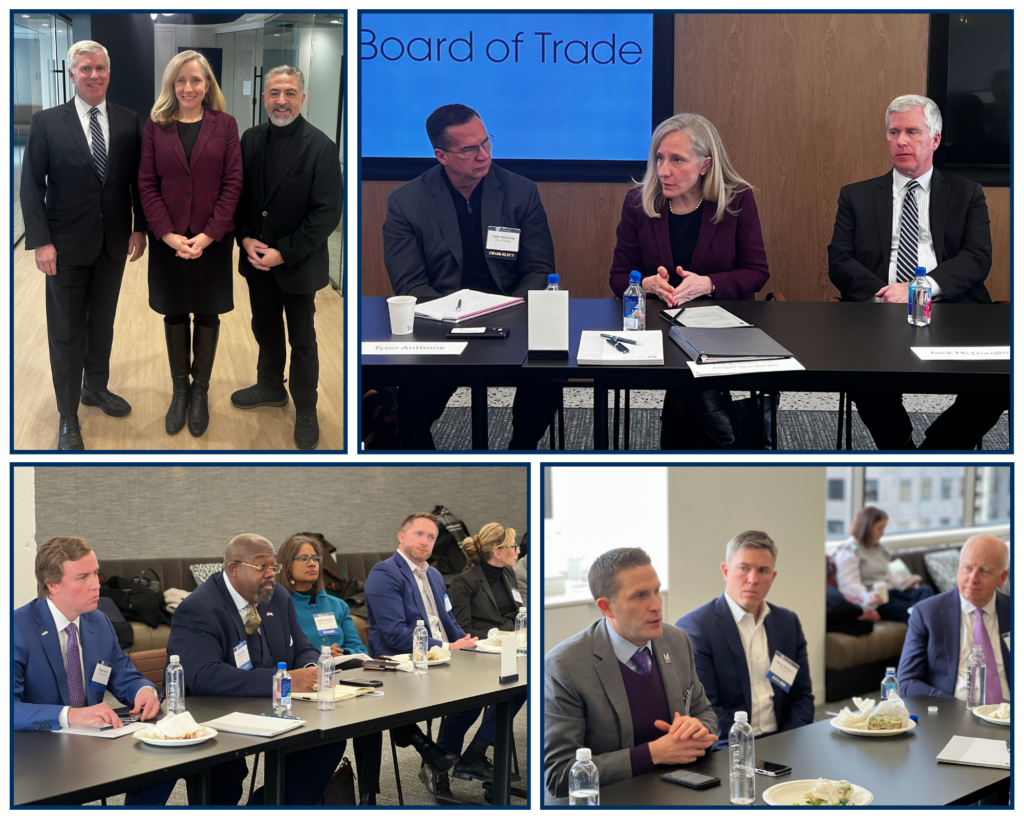
Innovation and Technology
Former Congresswoman Abigail Spanberger sees technology, particularly AI, as a powerful tool for advancing Virginia’s capabilities. She encouraged leveraging AI to streamline operations, identify irregularities, and drive efficiencies across sectors. By embracing AI and other innovations, Virginia can position itself as a leader in tech-driven growth.
Veterans and Second Careers
With its significant military presence, Virginia has a unique opportunity to attract veterans transitioning to civilian careers. Spanberger stressed the need for better communication about resources that are available to veterans through the Virginia Department of Veterans Affairs, ensuring veterans have access to employment opportunities and support networks.
Public-Private Collaboration
Spanberger emphasized the importance of collaboration between government and businesses. From expanding broadband access to addressing workforce challenges, she pointed to public-private partnerships as essential for achieving lasting solutions. Engaging businesses in the legislative process through white papers and research ensures policymakers are informed and equipped to address evolving challenges.
A Regional Perspective
Spanberger also reflected on how federal policymakers perceive Virginia and the Greater Washington region. While the proximity of Northern Virginia to federal institutions offers advantages, it can also lead to regional issues being overshadowed by other priorities. Building stronger relationships between regional stakeholders and federal decision-makers is key to advancing collective goals.
Moving Forward: A Call to Action
Spanberger’s insights underscore the importance of collaboration and strategic planning to tackle Virginia’s most pressing issues. Whether through policy initiatives, public-private partnerships, or workforce investment, her vision offers a roadmap for creating a vibrant, equitable, and innovative Virginia.
More policy discussions with the Board of Trade in the months to come
Thank you to Abigail Spanberger for joining us for this important discussion. We look forward to further policy discussions with leaders this spring and summer, including seperate discussions with both Virginia Lt. Governor Winsome Earle-Sears and Maryland Lt. Governor Aruna Miller. We also have a firstside chat on airtificial intelligence with Don Beyer in early-April.
Upcoming Opportunities for Regional Government and Business Leaders:
Join us for our 105th Mid-Winter Dinner, presented by G.S. Proctor & Associates, Inc., and enjoy an evening of elegance and entertainment at the Washington National Cathedral! This black-tie gala includes a delicious three-course dinner and allows you the opportunity to mix and mingle among the region’s most prominent business leaders and government officials. This is one of our premier networking events that helps our member and partner organizations fully take advantage of the Board of Trade and its connections with the community that we continue to help grow.

Join us for Coffee & Conversation, where member executives engage in interactive, peer-to-peer discussions on timely topics impacting the business community. These conversations play a vital role in shaping programs and policies that drive the region’s economic resilience, workforce development, transportation systems, technological progress, and overall health and wellness.
Letter of Support: Enable Enhanced Broadband Deployment for Improved Connectivity in Prince George’s County
About This Letter of Support: Greater Washington Board of Trade signed on to this letter of support with our member Crown Castle, which advocates for implementing Crown Castle’s Rapid Connect fiber construction method, an innovative way of building fiber to expand broadband access in our community.
We are writing to advocate for the implementation of Crown Castle’s Rapid Connect fiber construction method, an innovative way of building fiber to expand broadband access in our community. While the County’s Department of Public Works & Transportation and Department of Permitting, Inspections and Enforcement has been engaged since the spring of 2024, we have yet to see movement on its implementation.
Rapid Connect uses a small moving crew and safety vehicles to simultaneously cut, place, and seal underground fiber. This method meets the highest safety standards, is environmentally conscious, minimizes disruption and community impact, reduces deployment time, and blends seamlessly into our streetscape. As a result of this simplified construction process, Crown Castle can complete fiber construction in weeks instead of months, and at a fraction of the cost.
Data demand is growing quickly. For instance, it’s expected that mobile data traffic in North America will grow by 150% by 2029. Improved connectivity is crucial for improving access to vital resources and services, including educational opportunities, digital healthcare, connected transportation, public safety and many of the Plan Prince George’s 2035 strategies. As connectivity demands surge, Rapid Connect is the fastest and most effective solution to build networks that can keep pace with each community’s growing needs. In Addition, embracing this type of innovation can help communities become broadband ready and more competitive as states allocate funding. Crown Castle has successfully rolled out Rapid Connect in neighboring communities, including Montgomery County, D.C., and Alexandria.
We urge the County to support the adoption of Rapid Connect. Modern life depends on broadband access, and Rapid Connect can expand access much faster than traditional construction methods to foster a more connected community and ensure Prince George’s County remains competitive and prosperous.
Sincerely,
Ashley Greenspan
External Affairs – DC, MD & VA
Crown Castle
